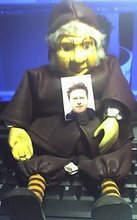When I wake up, the first thing I do is to check my emails and RSS feeds, in truth to check if I have any books and book-chat(ardent book swapper and reader- see my other blog if curious) but also to see if anything new comes up from the Quaker community. This is what caught my eye. This is a correspondence on different views of what it is to be Quaker. Links to the discussion can be found by clicking on http://quakerpagan.blogspot.com/2007/05/
following-is-reply-by-marshall-massey.html. The core of the debate for me is captured for me in this extract.
Traditional Quakerism takes its practitioners to a specific face of the divine that is (in my personal opinion) either identical or virtually identical to the face that the historic Jesus Christ showed his followers. But (still just speaking personally) I do not believe that the face of the divine experienced by modern Pagans who "draw down the God" is the same face or even anything near the same face. I do not deny that there is something one may validly call "divine" about it, but I do not, personally, believe that what is divine in it is what Christ wanted us to practice and approach.
A community that defines itself by relationship to the divine, without looking carefully at what it means by that word, is, in my personal opinion, a community that is quite capable of going profoundly wrong. I think it was this sort of inattention to changing understandings of the divine that led the humble, meek early Christian religion to evolve over the course of a thousand years into something that hosted the Inquisition and the Crusades.
This spoke directly to the pages I was reading as I fall asleep. Beth Allen on page 61 talks about British Friends that hurt others by their ministries and are then hurt by the responses back. One group is those that have a close and personal relationship with Jesus, God and the Spirit and see the answer as turning to the Christian God for all of us to be flooded with the experience of God's Love. The other group she mentions are those that go beyond all traditional Christian and Theistic God language and want Friends to move away from historical and dated forms, Both remain baffled and even angry when they are eldered that this is not speaking to the condition of all.
Friends practice rests on experience and asking what does it mean to you rather the authority of others. So when faced with these conflicts, one way forward is not to argue with the words but to explore why Friends experiences lead them to express the Divine in the way they do. As at the heart of our lives is often an attempt to answer the Francis of Assisi prayer, God, who are you? God, who am I?
Beth Allen also puts forward a key principle she has discovered over the years based on an approach first put forward by J.S.Mills. This is
People are mostly right in what they affirm and wrong in what they deny.By this she means, I like to read contemporary literature so those that read mass paper book romances are wrong. In doing that I am denying the richness of their experiences. So lets ask instead,
What are the people whom we find so difficult denying, what are they affirming-and why? What am I denying and what am I affirming and why?To end as Beth does, as I have not had a morning cup of tea and I have to leave to attend Meeting in five minutes,
What is forbidden to me?...to despise another's wisdom, to blaspheme another's God ( Quaker Faith and practice 26.41)

No comments:
Post a Comment